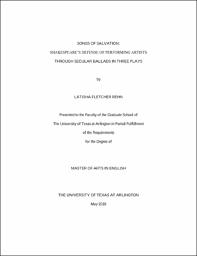
ATTENTION: The works hosted here are being migrated to a new repository that will consolidate resources, improve discoverability, and better show UTA's research impact on the global community. We will update authors as the migration progresses. Please see MavMatrix for more information.
Show simple item record
| dc.contributor.advisor | Tigner, Amy L. | |
| dc.creator | Fletcher, Latisha Dawn | |
| dc.date.accessioned | 2019-02-27T01:32:29Z | |
| dc.date.available | 2019-02-27T01:32:29Z | |
| dc.date.created | 2018-08 | |
| dc.date.issued | 2018-07-24 | |
| dc.date.submitted | August 2018 | |
| dc.identifier.uri | http://hdl.handle.net/10106/27821 | |
| dc.description.abstract | In many of Shakespeare’s comedies and romances, the “broadside,” or street ballad is the prominent musical form that the characters reference. The broadside transcended class boundaries and, unlike traditional songs, usually consisted of lyrics written by a known writer that were sung to a folk tune. The subject matter of these songs was seldom virtuous, and the inclusion of the somewhat unsavory street songs carries connotations beyond audience identification in Shakespeare’s work when viewed through a theological lens.
The government-sanctioned Protestant religion was becoming more staunchly conservative in London, and what theater-goers would often have observed outside the Globe were fervent Puritan protesters condemning actors and musicians as an abomination to God. The list of grievances held by conservatives toward players was extensive, ranging from their distaste of earning profit from false identities to their disdain for the feminization of men who dressed in women’s clothing to play the roles of leading ladies. Religious tracts were circulated that cited debaucheries and heresies committed by the theater; however, royal mandates barred playwrights from defending themselves through their art. The inclusion of secular ballads, such as “Greensleeves” in The Merry Wives of Windsor, however, alludes to Shakespeare’s growing resentment toward his detractors in the Puritan movement.
Shakespeare’s defense of performing artists is in part constructed from the ballads that he chooses for his characters to sing. The musical allusions and performances found in The Merry Wives of Windsor, As You Like It, and The Winter’s Tale produce an intricate web of confession and condemnation that leads the playwright out of the realm of conformist toward a less complacent persona as an opinionated critic of his culture. I argue that while writing under the weight of royal censorship, Shakespeare’s covert use of objectionable street ballads in the comedies works to undermine the piety of Puritans and expose their priggish condemnatory nature as folly. | |
| dc.format.mimetype | application/pdf | |
| dc.language.iso | en_US | |
| dc.subject | Merry Wives of Windsor | |
| dc.subject | As You Like It | |
| dc.subject | Winter's Tale | |
| dc.subject | Puritans | |
| dc.subject | Broadside ballad | |
| dc.subject | Stephen Gosson | |
| dc.subject | Shakespeare | |
| dc.subject | Jaques | |
| dc.subject | Autolycus | |
| dc.subject | Falstaff | |
| dc.title | SONGS OF SALVATION: SHAKESPEARE’S DEFENSE OF PERFORMING ARTISTS THROUGH SECULAR BALLADS IN THREE PLAYS | |
| dc.type | Thesis | |
| dc.degree.department | English | |
| dc.degree.name | Master of Arts in English | |
| dc.date.updated | 2019-02-27T01:32:29Z | |
| thesis.degree.department | English | |
| thesis.degree.grantor | The University of Texas at Arlington | |
| thesis.degree.level | Masters | |
| thesis.degree.name | Master of Arts in English | |
| dc.type.material | text | |
| dc.creator.orcid | 0000-0002-1164-4587 | |
Files in this item
- Name:
- FLETCHER-THESIS-2018.pdf
- Size:
- 511.9Kb
- Format:
- PDF
This item appears in the following Collection(s)
Show simple item record


